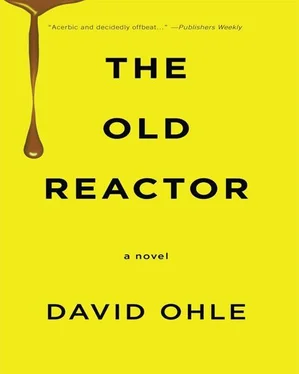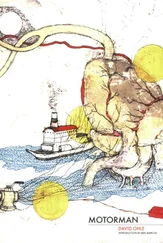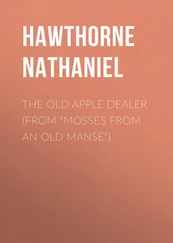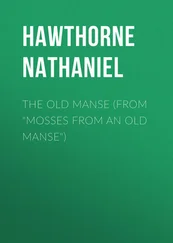David Ohle - The Old Reactor
Здесь есть возможность читать онлайн «David Ohle - The Old Reactor» весь текст электронной книги совершенно бесплатно (целиком полную версию без сокращений). В некоторых случаях можно слушать аудио, скачать через торрент в формате fb2 и присутствует краткое содержание. Год выпуска: 2014, Издательство: Dzanc Books, Жанр: Современная проза, на английском языке. Описание произведения, (предисловие) а так же отзывы посетителей доступны на портале библиотеки ЛибКат.
- Название:The Old Reactor
- Автор:
- Издательство:Dzanc Books
- Жанр:
- Год:2014
- ISBN:нет данных
- Рейтинг книги:4 / 5. Голосов: 1
-
Избранное:Добавить в избранное
- Отзывы:
-
Ваша оценка:
- 80
- 1
- 2
- 3
- 4
- 5
The Old Reactor: краткое содержание, описание и аннотация
Предлагаем к чтению аннотацию, описание, краткое содержание или предисловие (зависит от того, что написал сам автор книги «The Old Reactor»). Если вы не нашли необходимую информацию о книге — напишите в комментариях, мы постараемся отыскать её.
The Old Reactor — читать онлайн бесплатно полную книгу (весь текст) целиком
Ниже представлен текст книги, разбитый по страницам. Система сохранения места последней прочитанной страницы, позволяет с удобством читать онлайн бесплатно книгу «The Old Reactor», без необходимости каждый раз заново искать на чём Вы остановились. Поставьте закладку, и сможете в любой момент перейти на страницу, на которой закончили чтение.
Интервал:
Закладка:
A reporter for the City Moon had a choice encounter with Mayor Grendon only twenty-four hours ago. The reporter was lunching at a Saposcat’s when the perennial candidate came in to eat. It was near freezing outside. A pre-snow sleet crusted the Deli window. The reporter was determined to find a story and intruded at Grendon’s table. “Will you make a statement, sir?”
“Of course I will. Stay here and eat with me. The snow is a bluff. In an hour the sun will shine.”
The reporter took out her pad and pencil and said she was a journalist.
Grendon said, “Tell them I am long gone but not forgotten. I will run strong come the election. Tell them I have a plan. In the future I see underwater vessels as big as street cars, fish-like in shape, using lateral undulation as propulsion. This form of sub surface transportation will carry thousands at once — Bunkerville to Altobello, Altobello to Bunkerville — with every passenger as happy as a pig. And very inexpensively. Tell them all that.”
“A beautiful idea, sir.”
“Sublime would be a better word. The sublime always trumps the beautiful.”
“What do you see in Bunkerville’s future?”
“I can say this: that there will be no more rain. We’ll be in a sunspot minimum that will last for twenty years. We will tell the people that grasshoppers store water in their abdomens and that eight or more of them should be eaten every day. It won’t be long before we will require one hour of screaming as a daily practice.”
Grendon went on to reveal plans to starve himself unless elected. He will be dead by Saturday, the fourteenth day of the fast unless he is elected the day before, in which case he will take food. He’ll go this Friday to City Park, rent a pedal boat, and pedal his way to the middle. There he may or may not succumb to starvation, depending on the election results.
“What about housing, sir? Is Bunkerville prepared for the expected jellyhead immigrations?”
“This is what I can say about housing: as jellyheads progressed, they acquired cattle and roamed about searching for pasturage. Then they built a cave of skins to live in. When they learned how to fashion crude bronze tools they began cutting down trees and building homes that resembled log caves. When ice descended from the arctic, driving jelly-heads southward where there were no caves, primitive jellies built crude mud huts.”
“Thank you so much, sir. Good luck in the election.”
“As I’ve said before, if I’m not elected, my suicide will follow. Ask Zanzetti if he’s willing to do the same?”
While Salmonella slept in her nook, Moldenke fought to stay awake. The motor cruised monotonously down the Byway. There were other motors speeding to the Point. Happy riders waved from their windows. “We’re going home! We’re going home!”
Moldenke felt excited by the prospect of returning to Bunkerville. With his late friend Ozzie exploded and gone from the house, he and Salmonella would assess the situation with the artisanal jellies and see if they could work with them to put the place in order. With attorneys and clerks out of business, the maintenance funds could never be recovered. After the liberation, the currency would be worthless.
Pulling onto Wharf Road at Point Blast, Moldenke saw flood lights moving along the black hull of a freighter, the Pipistrelle . Passengers were boarding. He turned back toward Salmonella’s nook. “Wake up, girl. We’re almost there.”
There were dozens of motors arriving, the drivers jockeying for places to abandon them.
Salmonella hurriedly shucked her nightgown and got into traveling clothes.
Moldenke had only begun to look for a good place when the motor ran out of heavy water and rolled to a stop in a cloud of steam.
“It looks like the end of the line,” Moldenke said. “Goodbye, Altobello.”
Salmonella felt a small touch of sadness at leaving her birthplace.
It was an almost normal Friday night in Bunkerville, two days before the liberation, when radio-poisoned mud fish began to rain down. Anyone outdoors in much of the city was caught in the downpour. Dead fish piled up in gutters and sidewalks quickly. Walking or running was a slippery venture. Pedestrians, in their haste to get out of the shower, stepped on mud fish. Many fell in the process and sustained injuries in addition to a dose of radio poisoning that came with the fish.
There have been other falling-fish events reported from time to time over many decades in Altobello, Bunkerville, and elsewhere. Because the Altobello-Bunkerville fish falls occurred just before the liberation, those prone to superstition thought of them as forewarnings of the momentous changes to come. Many a Bunkervillian shared the belief.
“These fish had to travel from the Old Reactor pond in Altobello,” Scientist Zanzetti said. “Something, and we don’t know what, sucked them up into the air then carried them hundreds of miles to here. This has been a deadly rain and we expect many will die within months, especially the old and the young.”
The affected areas of the city are depopulated and a cleanup is thought to be in progress. Among those poisoned that night was perennial mayoralty candidate, Felix Grendon, who had gone to see Misti Gaynor and Enfield Peters in the comedy hit, Eventually, Why Not Now? Hundreds of glowing mud fish fell on him as he emerged from the theater.
With hundreds of returnees on the Pipistrelle , there was a shortage of cabin space. Most shivered on deck in the open air. Moldenke and Salmonella considered themselves lucky to find a space to sit down against the fo’c’sle, where they had something to lean back against.
Moldenke closed his eyes for a few minutes of rest, but sat up when his bowel began to anger. There were free people sleeping everywhere. Could he find a place to relieve himself without stepping on them, or worse, cutting loose inside his uniform on the way to the ship’s rail? Given that choice, he elected to stay where he was and let go right there if it came to that. He thought back on what he had eaten that day.
“I’m having an attack,” he told Salmonella. “That scrapple this morning. It was a mistake. I can’t stop it.” He lifted a hip and emptied his bowels into the leg of his uniform.
In a moment, the Captain, standing on the fo’c’sle deck, looked over the rail and said to a mate, “Lower a lantern. I want to see what’s making that stink.”
When the lantern was lowered, Moldenke felt the heat of it on his head. “I’m sorry, sir. It’s a condition. These attacks come at the worst times.”
“You could have gone to the rail like everyone else.”
“I didn’t have time to get there.”
Salmonella affected a whine. “He’s my daddy and he’s very sick. Please. Leave him alone.”
The Captain turned to the mate. “The returnees are always sick and stinking. I’m going to my cabin and I’m closing the door.” He waved to the crowd on the deck. “Good night, all. We’ll be in Bunkerville by morning.”
In his conclusive study of the jellyhead gel sack, Scientist Zanzetti revealed his findings. These sacks have had a long history of study, always yielding contradictory evidence. The ontogenic contributions of the sack to the jellyhead brain vary greatly. Many theories have been proposed to account for its modifications. Whatever its phylogenetic significance, the gel sack is an important structure formed by invaginations of the head capsule.
When pressed, Zanzetti admits puzzlement. “We can’t understand it. The sacks communicate with distant sentient beings or entities, but why? Do they mean us harm?”
An aide of Zanzetti’s added, “We think they may be trying to use the jellyheads to weaken or destroy our culture, but haven’t perfected the training regimen. That’s why jellies do crazy things now. But in the future we see them getting better and better at civil behavior. Their influence then will be so subtle, so insidious, we’ll never notice. If this keeps up, we’ll become them. We’ll be jellyheads.”
Читать дальшеИнтервал:
Закладка:
Похожие книги на «The Old Reactor»
Представляем Вашему вниманию похожие книги на «The Old Reactor» списком для выбора. Мы отобрали схожую по названию и смыслу литературу в надежде предоставить читателям больше вариантов отыскать новые, интересные, ещё непрочитанные произведения.
Обсуждение, отзывы о книге «The Old Reactor» и просто собственные мнения читателей. Оставьте ваши комментарии, напишите, что Вы думаете о произведении, его смысле или главных героях. Укажите что конкретно понравилось, а что нет, и почему Вы так считаете.












